

Fondwa, Haiti
A Rural Community Development in Haiti
drying grain
Fondwa is a small community village in the western department of Haiti. Before 1988, there was no basic infrastructure in the area and people had no access to roads, drinkable water, health care, education, electricity, or technical assistance for agricultural activities. Although the people of Fondwa paid taxes, they did not receive any services from the government. In response to the isolation and lack of assistance, the people of Fondwa and their neighbors took action and created a project of integrated rural development. In April 1988 the peasants organized themselves and founded the Peasant Association of Fondwa (APF).
Asosyasyon Peyizan Fondwa
Since its emergence in 1988, APF has had several projects to provide the community of Fondwa and its surrounding communities with the following: accessible water, a health clinic, a primary and secondary school, adult literacy classes, a road, reforestation and soil conservation, a community store, grain storage, a community radio, a credit union, and a guest center.
APF's primary goal is to empower the people to assume responsibility for their own lives. APF looks toward the future by shifting its focus to building a sustainable economy in the area. A number of small businesses have been launched: a poultry farm, a cooperative pig venture and meat processing plant, a bakery, and a restaurant.
Today APF
has about 400 active members registered in about 15 small groups from
various
areas of Fondwa and its neighborhood.
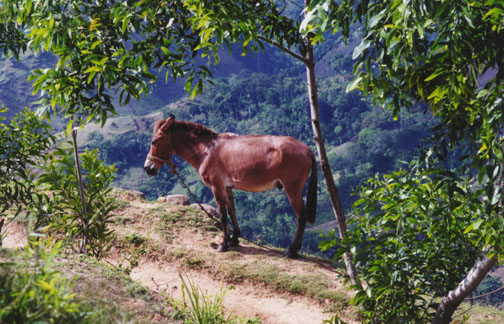
local transportation
![]()
I visited in July of 2000 as part of a
and am offering my Reality Check of the project.
![]()
Some Projects of APF From 1988 To The Present
Water Facilities:. We have captured 10 water sources, built 10 public fountains and 7 reservoirs to collect rainwater for the families of Fondwa. Our plan is to capture water for irrigation purposes in the next coming year.
Reality Check: Many of the plastic pipes have been broken and/or faucets not working properly. Have not trained adequately in maintenance.
road to the Fondwa buildings
("guest house" is white building on the right)
Road: We
have built a rough road of 5 kms and traced 15 more kilometers. We have planted more
than 3,000 plants along the road to protect it from erosion. We have a
maintenance team that works on the road as needed. We are still working on the first
2 kilometers to finish it to the point that all types of vehicles can use it, even
though
we do not yet have
the means to pave it
Reality Check:
On my visit heard complaint that the people will not volunteer to help maintain the road. Since they were initially paid they now expect to be paid for any road work.
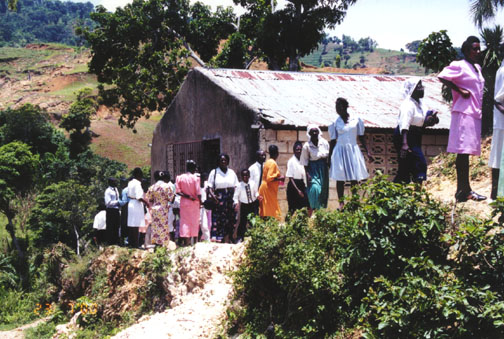
on Sunday at the local Protestant church
Health Care Facility: A small medical clinic where people can receive a medical exam for less than 1/5 of the cost of the same exam in Port-au-Prince. We have a small drugstore, where the medicines am sold at about 50% of their price elsewhere.
Reality Check:
At the time of my visit no nurse was available. (which was the only medical person.) Cannot do immunizations because no refrigeration is available which can operate 24 hrs a day. (suggest a small propane gas powered cooler for this purpose)Since the clinic must "pay for itself" a markup is applied on any drugs dispensed, over the procurement cost.
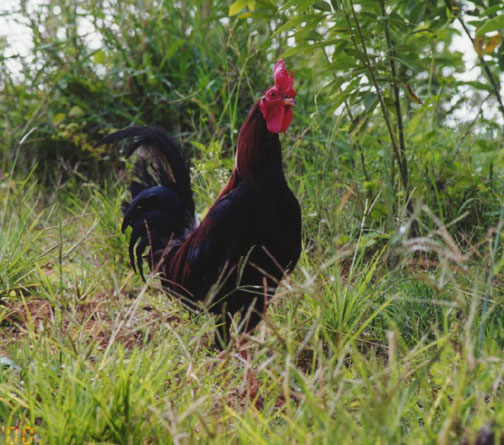
improved poultry stock introduced from Cuba
School: Educating children is the cornerstone of empowerment and our hope for a better life. APF is devoted to education- We have combined four small schools in the area to form "one large school.' called St. Antoine. This effort to pool our resources has brought a much better education for our children. In St. Antoine, we have a Primary Section with about 500 boys and girls, a secondary Section with 25 students, and a Vocational Section with 15 students. Unfortunately, some of the families are not able to pay the $10-30 a year needed to sent a child to school.
Reality Check: With limited resources, the family often chooses to send the boy to school instead of the daughter.
The Piggy
Bank Project: We believe that ultimately the solution to the financial
problems of the school is to economically empower the children to finance their
own
educations
by raising pigs, making jellies out of grapefruit, working in small,
temporary jobs and receiving training in a skill that will enable them later
to participate fully in the development of their community. So far, we have
helped 50 students to find a small job during a period of three months that
enabled them to pay their entire school year. Unfortunately, it was only for a
small group and for a specific time.
widowed woman with 10 children who was paying 60% APR interest
Savings & Loans Service: We have a Credit Union where members can get access to financial services such as loans and savings programs. We have about 200 members who have joined this program and about 150 of them have already received a loan in our Credit Union.
Reality Check:
One widow we meet borrowed 100 gourdes for six month, but was having trouble paying back the 130 gourdes required. Note: an APR of 60%. (Something is wrong!)Community Store: We have a small Grocery Store that enables the people to save time and money by buying the goods they need for their small businesses at a reasonable cost.
Reality Check:
Why not a co-op where the members share in the profits?
grain storage shed
Grain Storage Program: A common problem in Haiti is that farmers are forced to sell their grains during the harvest season to feed their families, but then must buy them back during planting season at exorbitant rates. APF now buys the grains (mainly black and red beans) from its members when they need the cash, and then stores them until planting season, when it resells them at a fair price. This allows us to keep the resources of the community for the use of its members, rather than letting other people from the outside use them for their personal profit.
Reality Check: A check indicated that this season nothing was stored. The storage shed was empty. Said that in previous years people were paid to collect grain from the farmers, but not this year. Seems the project is not community supported.
Tree Planting: APF is dedicated to restoring its environment by planting as many trees as possible. We have already planted more than 500,000 trees.
Literacy Program: In Fondwa, the illiteracy rate is about 85%.We have developed a game that helps people to acquire reading, writing, and business skills in a two-month period. Since APF's inception, we have trained about 500 people.
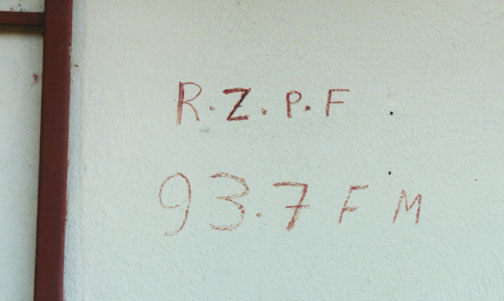
radio station
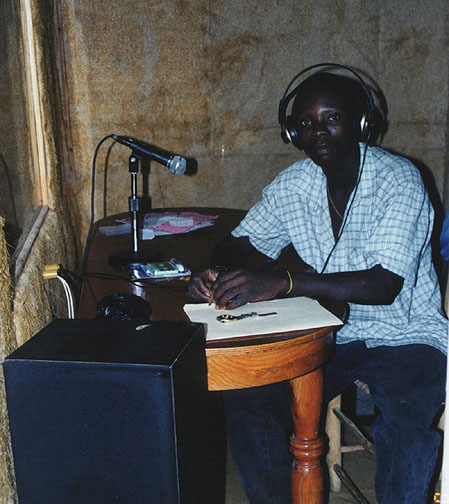
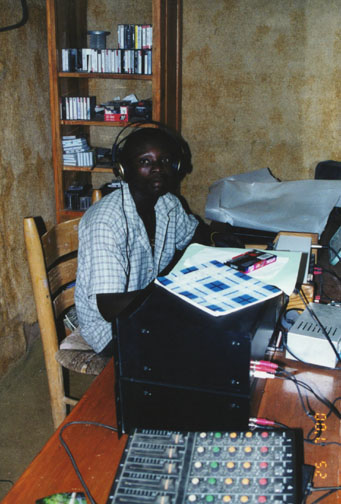
Radio Station: This is a powerful vehicle for us to educate the people of our Community, Village and its neighborhood. It helps us to create a link between our active members and the rest of the Community. One of the messages is to "Wash your hands with soap before eating" to reduce the spread of disease.
My Note: This can be a real value in a Democracy where anyone can talk about any subject, including the complaints that for years had to be stifled.
Reality Check:
The radio only operates several hours a day, when the generator is running. (since its power consumption is modest, an inverter/converter and battery could be used to make it more independent of the generator)
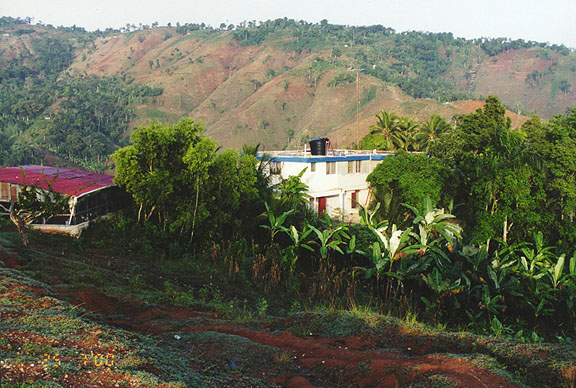
"guest house"
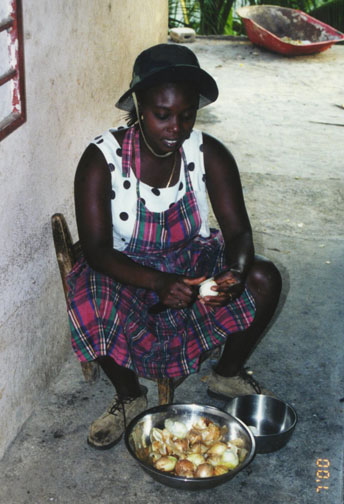
preparing food for "guests"
Center for Research & Continuing Education: ("Guest House") We offer practical workshops in community development for the people of Fondwa and for any other organizations. We have space to provide room and board for about 60 people.
Reality Check:
Much of the funds, available from the E.U., and others, ended up creating this dormitory and meeting hall. It appears to be used mainly to invite outside groups to visit, as a fund raising effort. The local complaint was that the funds we paid were not getting to them. During my stay, the person in charge of the "seminar" was very negative, not being able to point out the successes of the sustainable community.
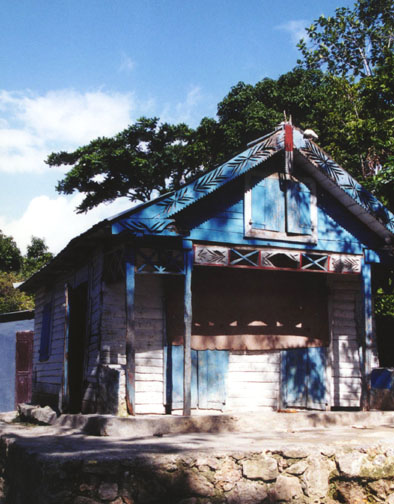
Birth house of Father Joseph Philippe
The Sisters of St. Antoine of Fondwa: In October 1996, a native women's religious order was founded in Fondwa by two religious women - Sisters Simone and Carmelle. Their goal is to live in solidarity with the poor like Jesus did. They adopted the spirituality of St Francis of Assisi and have chosen Fondwa as their mission site. A principal project of the Sisters is the Orphanage Of Fondwa. The sisters care for 57 children from the ages of 3 to 25. Most of them are not orphans, but are from poor families who cannot take care of them.
Reality Check:
Over 50 children are housed in two small rooms next to Father Joseph Philippe's birth house. The two sisters provided limited time with the children, since they were also in charge of the guest house, about a half mile away. There was no formal schooling or training provided.
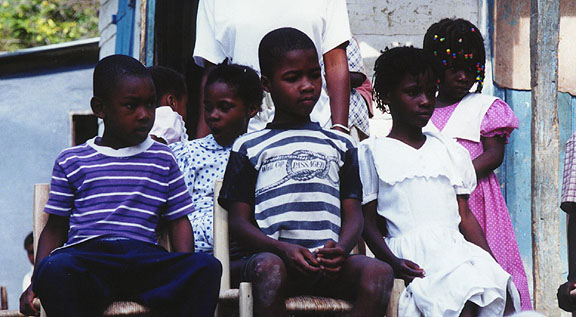
some of the children cared for
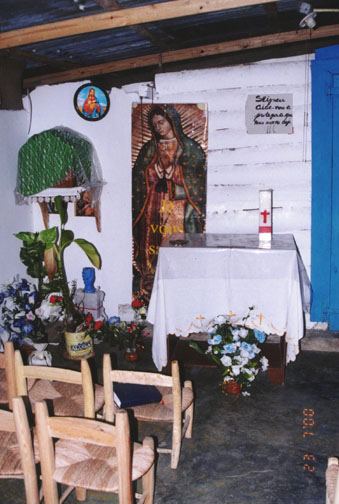
their small chapel
![]()
Reality Check:
I am
concerned that "Sustainability" seems to be measured in making each
one of Father Joseph Philippe's projects pay its own way and make a little
money,
rather than be co-op enterprises of the people
where there is volunteer spirit
and a sharing of a useful and profitable Endeavour.
![]()
On the Plus side:
The
effort, arranged by Father Joseph, in combination with another third world
country, to have a resident veterinarian work with the farmers on the care of
their animals,
and an
agronomist working with farmers to show improved agricultural methods in
demonstration plots,
shows tremendous promise
This is the best example of how aid should be extended
![]()
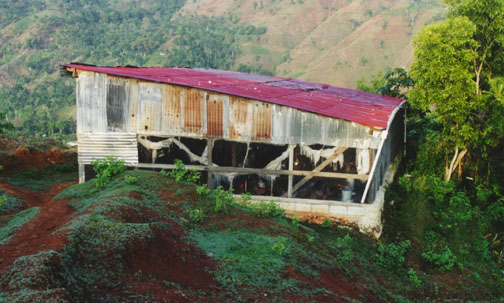
the poultry project
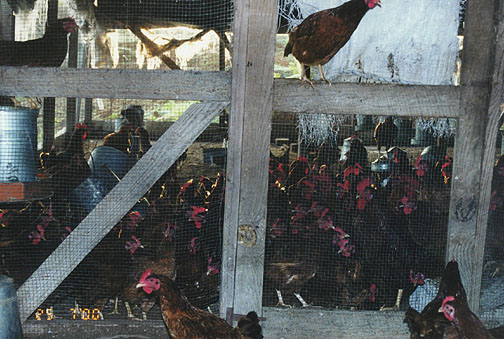
egg laying house
![]()
![]()